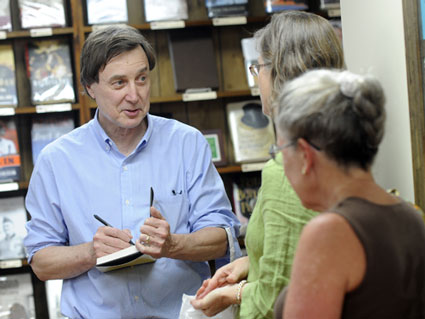 |
| Greg Pence, left, at a recent book signing. |
Science moves fast these days, and remarkable tools for human enhancement seem to emerge frenetically. Society often questions the way these tools should be wielded or whether they should be used at all.
Should steroids be used to boost performance? Should people use mind-enhancing drugs? Should women undergo cosmetic surgery to re-shape their bodies? Should we fear stem-cell research? Is it moral to use anti-depressants to feel better than well? What’s wrong with engineering a better embryo? Hype and paranoia on these topics surround us — from steroids in Major League Baseball to cosmetic enhancements on reality TV.
UAB philosophy Professor Gregory Pence, Ph.D., examines these issues in his latest book, How to Build a Better Human: An Ethical Blueprint, released Aug. 16. In the book, Pence writes about improving the human stock from two directions — eliminating dysfunction caused by bad genes and trauma and allowing adults voluntarily to improve themselves. To do this, Pence says, the “underground” research being performed on steroids, mind-expanding drugs, doping and cosmetic dermatology must be studied in the open, scientifically. Pence uses science, logic and ethics to analyze these controversial and ethical issues, as he did in previous works, including Medical Ethics, Elements of Bioethics, Who’s Afraid of Human Cloning? and Cloning After Dolly.
| In How to Build a Better Human, Greg Pence, a medical ethicist, argues that careful, ethical people can use genetics, biotechnology and medicine to improve themselves. To do this, he believes that we must refuse to reject or embrace these advances without careful consideration. In doing so, bioethics can become part of the solution instead of the problem. |
In How to Build a Better Human, Pence, a medical ethicist, argues that careful, ethical people can use genetics, biotechnology and medicine to improve themselves. To do this, he believes that we must refuse to reject or embrace these advances without careful consideration. In doing so, bioethics can become part of the solution instead of the problem.
Pence, who coached UAB’s Ethics Bowl Team to a 2010 national championship, recently talked to the Reporter about the role of ethics in biomedical research and the students who helped write his book.
Q: Why discuss the ethics of human enhancement?
A: Two reasons: first, huge sub-cultures practice enhancement. There is doping in professional cycling, there are steroids in other professional sports, and cosmetic surgery and mind-focusing drugs in professional schools. We should get this out in the open and study it scientifically. Second, why not strive for babies without genetic diseases or handicaps? Why not try to create better, stronger, smarter high-school graduates? We seem to be equalizing down when we could be equalizing up. Of course, it should be voluntary, not compulsory.
Q: How much does the noise interfere with respectful and meaningful dialogue?
A: “Noise” is a good word, and in bioethics it stops thought. Godwin’s Law in ethical discussions concerns how much time elapses before someone compares a topic to what Hitler or the Nazis did. But when applied to enhancement, the reasoning is fallacious. Just because the Nazi regime went to extremes trying to create one racial phenotype, doesn’t mean it’s a form of eugenics to give mothers folic acid to prevent their babies from having neural-tube defects.
Q: How does society decide what is or isn’t ethical in biomedical research?
A: Well, one standard is through review by Institutional Review Boards, but even then the research is generally intended to cure disease or dysfunction, not enhance abilities. Right now, we allow the market to decide about enhancements from physicians. People pay cosmetic surgeons and make private judgments about whether so-and-so was right to get a face-lift. But we decide against paying for someone else’s facelift when we disallow them from group medical coverage. This is not an organized way of deciding or studying research on enhancement.
Q: You enlisted students to help with the book?
A: I had nine great assistants — eight in the Early Medical School Acceptance Program and one medical student — help, and working with them was fun. Five are now in medical school. Three are here at UAB, and one is on scholarship in an M.D./Ph.D. track at the University of Chicago. One of the students is at Dartmouth, and four are undergraduates here.
Q: Why should students learn to write and discuss ethics in biomedical research?
A: Writing is thinking. Cutting a sentence from 40 to 20 words forces active verbs, logical flow and colorful examples. Medicine is incredibly verbal; it involves a great deal of reading and writing — more than people realize. What these students learned is invaluable and much more mind-expanding than memorizing facts. As an undergraduate, I would have been thrilled to help a book come together and then receive a copy of it signed by its author. My assistants also witnessed the incredible power of teamwork at UAB. Fellow professors Trygve Tollefsbol, Marcas Bamman and Lynn Stephens helped me fact check my assertions.
Q: Where can we order the book?
A: You can get copies on Amazon.com and Barnes & Noble. Signed copies are available at Alabama Booksmith. You also can purchase the e-book from Rowman & Littlefield.
